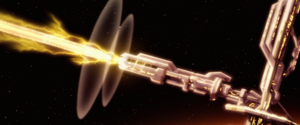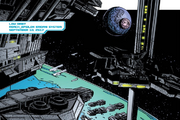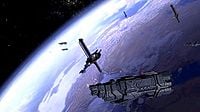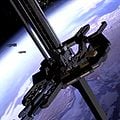Orbital defense platform
From Halopedia, the Halo wiki
- "That MAC gun can put a round clean through a Covenant capital ship."
- — Avery Johnson
An orbital defense platform[1] is a class of large UNSC space stations used to defend locations of great importance, typically planets of a high strategic value. They have the hull classification symbol of ODA.
ODPs are frequently placed in geosynchronous orbit and deployed in groups, or clusters, of two to five platforms. The well-equipped and large bridge of an ODP is suitable for directing large-scale engagements. Such was the case when Fleet Admiral Sir Terrence Hood directed UNSC forces from an ODP during the Battle of Earth. These platforms are capable of destroying even the largest of Covenant capital ships, but are vulnerable to Covenant boarding craft which can avoid the heavy slugs and latch onto the stations. Thus, it is up to the UNSC personnel within the stations to repel any boarders.[2]
Facilities
Internally, the stations are remarkably spacious, complete with high ceilings and a monorail system to move personnel and equipment. In addition to numerous small craft bays, there are two docks for larger ships, such as freighters, or even frigates. These docking bays could possibly be used to hold Longsword fighters used to protect the station from hostile spacecraft. The design incorporates many features against potential hostile boarding action, including security stations and small arms racks situated at strategic locations.[3]
Armament
The primary and crucial armament is a Mk. V "Super" Magnetic Accelerator Cannon capable of causing near-fatal damage to even a shielded Covenant capital warship with a single slug. The slug can weigh up to 3,000 tons and is launched at "point four-tenths" the speed of light,[4][5][note 1] ensuring the complete annihilation of the ODP's target.[3] As with starship-mounted MACs, a platform's cannon is commonly controlled by an AI.
Curiously, no sources indicate the presence of additional weapons, such as point defense cannons commonly mounted on UNSC warships (the absence of such weapons may explain why so many Covenant boarding craft were able to latch onto the platforms orbiting Reach and Earth). However, the possibility that ODPs are not armed with such weapons cannot be ruled out. The apparent lack of point-defense cannons may be explained by the fact that transient magnetic bursts tend to magnetize the weapons.
Power plant
ODPs do not possess the power generation equipment necessary to fire their main armament. Instead, they receive power from ground-based generators. An effective strategy to neutralize the formidable ODPs would be to disable the generators via ground assault. This would disable the platform's weaponry without destroying it, allowing this valuable prize to be captured or destroyed outright. The Covenant used this strategy during their invasion of Reach, dropping troops to the planet's surface and destroying these generators. This paved the way for Covenant forces to completely overwhelm the UNSC forces in the space battle over Reach.
Locations
Main Article: ODP Locations
Deployment
Reach
By August 2552, Reach was protected by twenty ODPs. At least one of these platforms was in place by May 2517;[6] a number were online by 2527.[7] During the Fall of Reach, the orbital defense platforms inflicted massive losses on the Covenant armada in the opening stages of the battle, as well as providing fire support for ground forces on Reach. Large numbers of UNSC forces were deployed to protect the orbital platforms' planetside power generators, but they ultimately fell against determined enemy assaults. The disabling of the defense platforms was a major factor on the battle's outcome.[8]
Earth
The outbreak of the Human-Covenant War prompted a massive expansion of Earth's defenses. Even as late as the Battle of Reach preparations had not yet been completed; they were set to come online on September 14.[9] By October 2552, some 300 ODPs were operational.[3] Many of Earth's ODPs were named after points of interest that they roughly kept station over.
A portion and small section of the 300 platforms first saw action at the early stages of the Battle of Earth. Athens Station and Malta Station were each destroyed by antimatter charges installed by Covenant boarding parties, while Cairo Station only narrowly avoided the same fate as the other platforms thanks to Master Chief's removal of the bomb on board.[2]
The ODPs were also used later in the Battle of Earth after Truth's fleet arrived, but the Covenant might have already destroyed numerous stations when Truth himself arrived at Earth on the Forerunner Dreadnought in November.[10]
New Carthage
The MJOLNIR GEN2 Infiltrator was tested on New Carthage's orbital defense platforms.
Known ODPs
- Athens Station UNSCDF-ODA144 (destroyed)
- Cairo Station UNSCDF-ODA142 (damaged)
- Malta Station UNSCDF-ODA143 (destroyed)
- Nassau Station (unknown)
Trivia
- All known orbital defense platforms over Earth are named after cities on Earth. As the stations are geosynchronous, it's possible they are named for the cities they orbit above. This is supported when in Halo 2 it states that the Cairo, Athens and Malta are part of one battlegroup, and the Earth cities they are named for are located close to each other geographically.
- The fact that there are 300 ODPs could be a reference to the Battle of Thermopylae, in which 300 Spartans used the phalanx formation to hold their own against an army of more than 200,000 Persians.
- Two weeks after the Fall of Reach, when the UNSC Security Council met at HIGHCOM in Sydney, it is mentioned by Colonel Ackerson that most of Earth's ODPs would take ten days before becoming fully operational.
- The kinetic energy of a single shell from an orbital defense platform would be equivalent to almost 51.6 gigatons of TNT, 1,031 times the yield of the real world's largest nuclear weapon currently tested.
- The ODPS entered the conceptual stage sometime before 2490, as Avery Johnson mentions that they were being proposed around the same time he shipped out for boot camp.
List of appearances
- Halo: The Fall of Reach (First appearance)
- Halo: First Strike (Mentioned only)
- Halo 2
- Halo: Uprising
- Halo: Evolutions - Essential Tales of the Halo Universe
- Halo Legends
- Halo: Reach
- Halo: Fall of Reach
- Halo 4 (Mentioned only)
Gallery
An orbital defense platform above Reach, along with the Epsilon Eridani Defense Fleet.
Nassau Station firing its MAC.
Cairo Station's battle cluster above Earth, one of dozens of triads in the orbital defense grid.
Cairo Station right before the Battle of Earth.
- Halo2 Concept 2.jpg
Concept art of an ODP's interior.
- Halo2 Concept 4.jpg
Concept art of a M12 Force Application Vehicle in an ODP's interior airlock.
- IntAir.jpg
Concept art of an ODP's interior airlock.
- Station gun con.jpg
Concept art of an ODP's weaponry controls.
An ODP, as shown in one of Halo: Combat Evolved Anniversary's Terminals.
Notes
- ^ While the Halo Encyclopedia lists the velocity as 40% the speed of light, the figure remains unchanged in the reissue of The Fall of Reach, a more recent source.
Sources
- ^ Halo: The Fall of Reach, page 330
- ^ a b Halo 2, campaign level Cairo Station
- ^ a b c Halo 2, campaign level The Armory
- ^ Halo: The Fall of Reach, page 283
- ^ Halo: The Fall of Reach (2010 edition), page 320
- ^ Halo: Fall of Reach - Boot Camp
- ^ Halo: Evolutions - Essential Tales of the Halo Universe, page 50
- ^ Halo: The Fall of Reach
- ^ Halo: First Strike, page 104
- ^ Halo 2, campaign level The Great Journey






